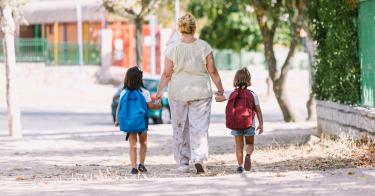Montana is one of the least populated states in the lower 48, but what flows out of it reaches to the far corners of the U.S. Montana is the only state hosting rivers that empty into Hudson Bay to the east, Gulf of Mexico to the south, and the Pacific Ocean to the west.
During National School Choice Week 2022, parents should be watching what else comes out of the Big Sky State.
A U.S. Supreme Court ruling in 2020 in favor of parents who choose private schools for their children and a state attorney general’s opinion in 2021 protecting the American ideals of freedom and opportunity in the classroom are giving a boost to parents trying to meet their child’s unique learning needs.
In 2020, the Court ruled in Espinoza v. Montana Department of Revenue that state officials could not prevent parents from choosing a school based on their most deeply held beliefs. Montana offers a K-12 private school scholarship program that provides tax credits for charitable contributions to nonprofit scholarship organizations.
>>> New Proposals Rejecting CRT See Through Radical Talking Points
But state officials had blocked parents from choosing religious schools. The court ruled that such schools could not be excluded.
One year after the ruling, commentators would dub 2021 the “year of school choice” as lawmakers in 19 states either created or expanded public and private school learning options for students.
During COVID, many parents wrestled with mask mandates and new vaccination requirements, along with sharply political classroom content, all while watching student achievement fall precipitously. Families appropriately started asking: Does our child’s school reflect what we believe is best—and if not, what can we do about it?
Montana Attorney General Austin Knudsen recently said in an e-mail response to questions about parent choices in education, “The school closures that occurred over the last two years have been one of the biggest catalysts for parental involvement and the school choice movement across the country.
“Legislators in Montana and across the country are going to have be responsive to the new energy and attention that’s been ignited,” Knudsen said. Knudsen addressed what has become a wildfire in his opinion from May 2021 where he stated, “The type of environment that is tolerated or encouraged by or at a school can therefore send a particularly strong signal to, and serve as an influential lesson for, its students.”
Some school officials are either tolerating or even encouraging dismissive attitudes toward parents. In Pennsylvania, a school board member recently penned commentary telling parents that he “doesn’t work for them.” Parents are free to “vent their spleens” to school boards but “to listen to your repeated distortions of the facts is nauseating.” He repeatedly opened his paragraphs with the phrase “with all due respect,” but it’s hard to conclude that he actually does respect parents.
Writing in CNN last fall, the 2021 New York state teacher of the year said that school board meetings have become the place where “scared and angry people descend” to make demands of board members “without filter or grace.” The teacher appears to be pleading for civil conduct, but she does not help her cause by insulting the parents who want to advocate for their children.
Montana’s Knudsen insists that “parents should be able to choose the education environment that best suits their children and their values.” His inclusion of “values” is noteworthy because these closely held beliefs have become the beating heart of National School Choice Week.
>>> Amid COVID-19’s Toll on Schools, Now More Than Ever, Students Need More Education Options
Parents have dealt with prolonged school closures due to COVID, controversial lesson plans, and intimidating tactics from interest groups. Teacher unions have lobbied to keep schools closed to in-person learning as student grades have suffered, with surges in D’s and F’s around the country. The National School Board Association colluded with the White House last fall to try to intimidate parents by criticizing individuals who have been speaking up at board meetings.
Parents looking for quality learning options for their children today stand between their desire for students to succeed and their belief that their ideas and values—religious or otherwise—should still matter. And that they should not have to set their beliefs aside when they choose how and where their child will learn or bring concerns to a school board.
This piece originally appeared in the Sacramento Bee




